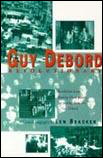

When a work this scholarly is this readable, this provocative, it's easy to recommend to others. Which I do, without hesitation. This is one of the best bios I've read in years.
...a surprisingly accessible intellectual biography, which provides the necessary historical and philosophical background to allow readers to make sense of his life and times. The biography successfully situates Debord's thought and activities within the context of world history and the trajectory of the modern revolutionary movement. As such it is an excellent place to begin an acquaintance with one of the preeminent post-World War II revolutionary groups.
Len Bracken's critical biography explores the ideas of Left Bank intellectual Guy Debord, who once wrote that there are 'everywhere revolutionaries, but nowhere revolution.' This is the first biography of Debord, who was the most combative member of the anti-surrealist Lettrist International movement, a leader of the May 1968 Paris revolt and the creator of the masterpiece book and film, Society of the Spectacle.
Debord also founded the Situationist International, a political and art movement of the '60s, which spurned the banality of everyday life imposed by convention, consumerism and alienation. Instead, they created imaginative yet realistic 'situations' intended to subvert the 'nihilistic comforts' of modern capitalist society.
The book is more of an overview of situaitonist theory than a typical biography, but the theory explains Debord's life best because he practiced what he preached. Bracken, who edits Extraphile, 'a journal of sub-proletarian revolution, utopian fantasy, pornography and conspiracy theory,' has written a biography that will satisfy those well-versed in stiuationist literature as well as those who have never heard of the half-Marxist, sometimes Leninist, usually drunk and often brilliant Debord.
While the original situationist texts are sometimes difficult to digest, there have been excellent secondary sources explaining their theory and practices. Guy Debord—Revolutionary is an excellent addition to this literature. By focusing on Guy Debord, who formed the group in 1958 after a stint in the Lettrist International, a drama unfolds ending with his dramatic suicide in 1994, on the eve of his nationally televised (France) film biography. Best known for his influence on the 1968 student protests in Paris, which escalated into a country-wide general strike, and his authorship of Society of the Spectacle, Debord remains a role model for alternative adventurers. His long silence and distance from the spectacle following the dissolution of the SI, links him to Duchamp's admonishment to 'go underground.' While New York was supposedly 'stealing the idea of art' from Paris in the fifties, it now becomes apparent that the real action was there all the time. Who today is influenced by Abstract Expressionism? What alternative artist today can fail to be influenced by Debord and his merry band of situationists?
[...] Bracken concentrates on Debord as a revolutionary thinker who has his own distinctive if elusive place among revolutionary thinkers. The result is a shocking revelation that is unlikely to interest the readers of the tabloids: Guy Debord was old-fashioned. [...] This old-fashionedness show itself not only in Debord's old-fashioned love of his city, his old-fashioned love of literature, but mostly in his old-fashioned integrity. Bracken gets at this fundamental issue by identifying Debord's 'project' with his life, rather than with the May rising in 1968 in France alone. He treats Debord's mythic or legendary period in Paris from 1952-1953 with the same seriousness that he applies to the formation of the Situationist International, the events of May 1968, and the twists and turns of Debord's contacts with publishers and film producers.
Cult figures require worshippers. Bracken is not prepared to be one of those. He is more than willing to draw attention to Debord's failings—his megalomania, his misuse of friends and supporters, and his apparent willingness to at times cooperate with those who would make a cult figure of him. In short, Bracken does his best, in all seriousness but not in all glumness, to get at what Debord actually thought and why, how Debord actually intended to live and why, and critiques Debord's project, his life, from that perspective.
This book has much to offer. One of its stated purposes is to make the life and writings of Debord accessible and I am happy to report that it in this, Bracken has succeeded.
Debord makes for daunting reading, and those who aren't versed in the dialectical underpinnings structuring his prose or the historical events that run parallel to situationist interventions can quickly get swamped. The greatest strength of Guy Debord—Revolutionary is its attention to precisely these problems.
Moving chronologically through the life of his subject, Bracken periodically gives us a synchronic exegesis of the historical events informing Debord's thoughts and actions, leading one friend of mine to remark that thanks to Len Bracken, she'd finally been able to "situate the situationists." Furthermore, Bracken does his best to outline, in a clear, succinct manner, the critical theory informing the practice—how the ideas that make up Debord's thought evolved, his original contributions to the Situationist International, and, most importantly, his conviction that critique had a vital function in the making of history.
This last emphasis ensures that, in marked contrast to other recent synopses, the revolutionary essence of Debord's life and activism remains front and center throughout. In this respect, Bracken's treatment is a welcome respite from the bizarre spectacle of the Situationists being transformed into cozy commodifible "anti-" artists in the MIT press's pseudo-radical Winter 1977 October art review or a gaggle of lit-crit academics competing to reduce Debord's legacy to stylistic nostrums a la Derrida, in tomes such as Pour Guy Debord (Gallimard, Paris, 1996), where, in the wake of Debord's death, "All that remains is literature" (and so on, ad nauseam) [...] Bracken's analysis is rich, his evaluations for the most part are subtle and intelligent, and his earnest commitment to the revolutionary agenda of Debord is refreshingly honest.